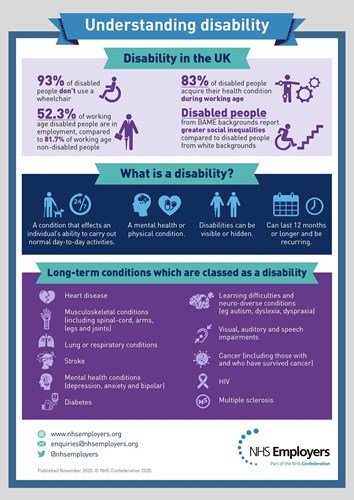International Day of Persons with Disabilities 2021
03 Dec 21
The UN has marked the International Day of Persons with Disabilities since 1992, to raise awareness on disability issues and highlight the importance of dignity, rights and well-being of disabled people. The day also aims to draw attention to the benefits to society as a whole of including persons with disabilities in every aspect of political, social, economic and cultural life. 
This year’s theme for International Day of Persons with Disabilities is ‘Not All Disabilities are Visible’.
It is estimated that 70% of disabled people are also living with one or more disabilities, many of which aren’t visible, for example mental health conditions, sensory impairments, cognitive impairment, autism / Asperger syndrome, autoimmune diseases, long-term health conditions, and neurological disorders.
Also, did you know:
- People with invisible disabilities often face additional challenges through a lack of support and understanding of their conditions because their disability is not outwardly visible.
- Invisible disability and chronic illness can often make it harder to access financial support, social services, employment, reasonable adjustments, and care.
- 1 in 7 people in the UK are neurodiverse. This means that the person’s brain processes, learns, and / or behaves differently from that which is considered typical (such as Autism or Asperger’s).
- The occurrence of disability increases with age – Globally around 1 in 7 working age adults (16 – 64) and almost 1 in 2 people over state pension age have a disability.
- 8.4 million people of working age reported that they were disabled in October-December 2020.
- 1 in 4 disabled people have two disabilities / conditions.
- 1 in 10 have three+ disabilities / conditions.
- 3 in 4 people believe there is some level of prejudice in the UK towards disabled people.
- 1.5 million people have a learning disability in the UK – this is approximately 2.16% of adults.
- Key areas of concern include financial support, adjustments in the workplace, and lack of awareness and social understanding.
The term ‘disability’ covers such a wide range of conditions, some of them we can see, but remember many of them we can’t, so if you or someone you know is living with any kind of disability and needs support, it’s really important you / they get the right kind that’s best suited to your / their needs. Google is a great place to start, even just typing in the kind of help you’re looking for, such as support groups / advice etc and where you live, will bring up lots of options. If that isn’t successful for you, then organisations such as the disability charity Scope, are a great source of help and information – and if they can’t help, they will know someone who can!
Scope’s helpline: 0800 800 3333 (Helpline | Disability charity Scope UK)
If you are struggling and need to talk to someone immediately, please call our 24/7 helpline on 0800 6444 101 or get in touch with the Samaritans on 116 123 (Contact Us | Samaritans)
Living with a disability isn’t easy, so today let’s all take a moment to think about how we can all play our part in making the lives of those living with all disabilities (the ones we can see and the ones we can’t) even better.

